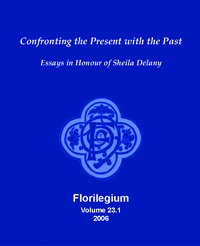Love and Race in a Thirteenth-Century Romance in Hebrew, with a Translation of The Story of Maskil and Peninah by Jacob Ben El'azar
Abstract
This romance, composed by a thirteenth-century Jewish author living in Christian Toledo, is written in biblical Hebrew and cast in the form of the Arabic maqamāh. The plot (an army invades an Arab territory; its commander, the "King of Beauty," falls in love with a female captive; the couple encounter a giant black warrior, kill him, and live happily ever after) invites a three-tiered reading: (a) a literal reading of the work as a conventional romance, in which the lovers are young and noble, the geography is mythical, and the hero wins his beloved after slaying a giant; (b) an allegorical reading of the union of Maskil (representing Intellect) and Peninah (signifying Beauty) as illustrative of the Platonic nexus of Eros, Beauty, Intellect, and the Good, while the monstrous Cushan represents unbridled sexuality, ugliness, bestiality, and evil; and (c) a historicized reading, anchoring the work in the religio-ethnic politics of the Reconquista (according to which Maskil is Christian, Peninah is an Andalusian Arab, and the giant Cushan is in an Almohad warrior, either a dark-skinned Berber or a sub-Saharan African). Read thus, the story problematizes historical issues of territory, border, conflict, contact, relocation, cultural transition, and hybridity.Downloads
Published
2006-01-01
How to Cite
Rosen, T. (2006). Love and Race in a Thirteenth-Century Romance in Hebrew, with a Translation of The Story of Maskil and Peninah by Jacob Ben El’azar. Florilegium, 23(1), 155–172. Retrieved from https://journals.lib.unb.ca/index.php/flor/article/view/12534
Issue
Section
Jewish Studies



